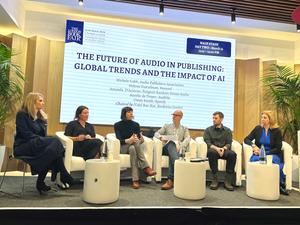 Despite some challenges, the audiobook market remains vital and with many areas ripe for sales and technological growth was the consensus of a group of audiobook experts speaking at a panel on "The Future of Audio in Publishing: Global Trends and the Impact of AI" on Wednesday at the London Book Fair, moderated by Videl Bar-Kar, v-p of audio at Bookwire.
Despite some challenges, the audiobook market remains vital and with many areas ripe for sales and technological growth was the consensus of a group of audiobook experts speaking at a panel on "The Future of Audio in Publishing: Global Trends and the Impact of AI" on Wednesday at the London Book Fair, moderated by Videl Bar-Kar, v-p of audio at Bookwire.
Michelle Cobb, executive director of the Audio Publishers Association, outlined the U.S. audio market, the biggest audio market in the world. There's been double-digit revenue growth for 11 years in a row, and now a majority (53%) of American adults have listened to at least one audiobook. Audiobooks account for about 11% of the U.S. book market, roughly the same as e-books. Cobb said cannibalization is not a problem. Some 17% of people take in books only in audio format, and about a quarter of library patrons borrow only audiobooks.
"The market is maturing but still growing," she said. Among areas of growth are titles in Spanish and other languages. The average age of audiobook listeners has continued to decline over the years: now nearly 60% of listeners in the U.S. are under age 45, and the fastest-growing segment of listeners is children, with more than 50% of parents now saying their children listen to audiobooks, a sharp increase in the past two years. The industry is "capturing listeners young and hopefully keeping them for the rest of their lives," she said. The result is that "the future continues to look bright."
 |
|
| From l.: Aurelie de Troyer, Audible; Helena Gustafsson, Storytel; Michelle Cobb, the APA; Videl Bar-Kar, Bookwire; Owen Smith, Spotify; and Amanda D'Acierno, PRH Audio. | |
As one indication of how far audiobooks have come in the U.S., Amanda D'Acierno, president & publisher, Penguin Random House Audio, said she remembered a time when "no one knew what audiobooks were" and she had to explain. She pointed out that 47% of U.S. adults still haven't yet listened to an audiobook: "There is a lot of promise" and "a very bright, very big future for audio."
D'Acierno noted that "as a publisher, we don't really worry at all about" market share. More important, she said, is getting an author's work "to as many people as possible." Print sales continue to grow, and "there has never been a negative impact from audio."
She also noted the growth of Spanish-language titles, aided because PRH owns Grupo Editorial and owns Spanish rights to many titles in the U.S. Kar-Ben observed that "the Spanish market has a long way to go," with approximately 20,000 audiobooks available for the half billion people around the world who speak Spanish. "It's a complex market, but there's a huge opportunity there," he said.
Aurelie de Troyer, senior v-p, head of UK & Europe, content, Audible, agreed that there continue to be "many amazing opportunities." She said Audible aims to "drive customer value" while "creating an environment that's supporting of creators" because "the future of audio is in the books and the creators." She noted that while Audible is well-known as a retailer, it is also a producer via Audible Studios. "Producing original content is definitely a big priority for us" as is "reinventing the way that we deliver audio content," whether that includes multivoice productions, soundscaping, and more. Audible is also adapting many graphic novels, recent novels in Germany, and classics in the U.K.
Owen Smith, v-p of product & technology for audiobooks at Spotify, stated that the company's entry into audiobooks--with a launch into several English-language markets--developed easily out of the company's experience with podcasts, which has "interesting parallels." He noted that when Spotify entered the podcast market, there were only about 200,000 podcasts available, and now there are five million. In the same way, the audiobooks catalogue is "so much smaller than it should be." Spotify, he continued, wants to find people who aren't audiobook users or are just casual users. To help do so, Spotify launched Audiobooks in Premium, which was "our way of trying to expand the industry overnight." Under the program, Spotify gave premium subscribers 15 hours of listening as well as audiobook recommendations mixed in with their music and podcast recommendations. This led, he said, to an "incredible jump in growth and listening to audiobooks in the U.S. and U.K."
Panelists generally indicated they were taking a cautious approach to using AI in narration. For some small markets with limited numbers of people speaking a language, the cost of traditional audio publishing can be prohibitive; AI could be an effective way of creating audiobooks that wouldn't otherwise be published.
Bar-Kar said that in his view, it was important to "let consumers decide" the matter, especially in smaller markets. Storytel is experimenting in ways that let consumers decide. The company found that some 90% of its customers have at least once "deselected" an audiobook because they didn't like the narrator's voice. Under its new Voice Switcher program, consumers can choose from three or four synthetic voices. The company has tested the program in several countries, and Helena Gustafsson, chief content officer, called it "a great way to give consumers a voice."
D'Acierno of PRH Audio noted that what made the U.S. audio market grow so much was "great productions... because if people are going to give you their time, you have to give them a great experience." She lauded the growth of audio editions of illustrated books and cookbooks and children's books, "creating newer experiences" that can include music and interviews and more.
Kar-Ben called discoverability "the holy grail" for the audio industry. Spotify's Smith noted that AI can be used for "incredible discovery products" and that Spotify already "does a lot of algorithm matches." --John Mutter

